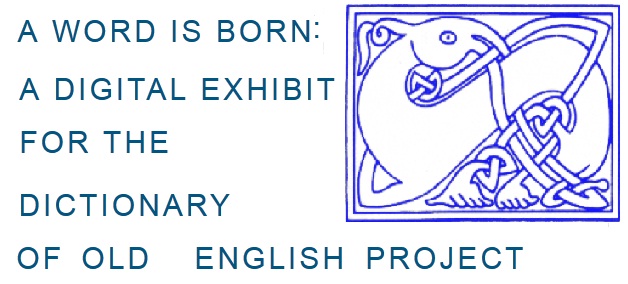Old Engli.sh
The Portal to the Language of the Anglo-Saxons
Read another, randomly chosen, past Old-Engli.sh News article:
Publishing Boom in Old English Text Editions: Reasons and Examples
July 2011
May 2015
A Step Forward: The Dictionary of Old English 2014 Progress Report
The 2014 Dictionary of Old English (DOE) progress report describes progress on the letter H, coordination with the Middle English Dictionary, and the creation of the virtual exhibit A Word is Born. Some notable retirements took place. Toni Healey, David McDougall, and Ian McDougall have stepped away after each devoting over 30 years of their lives to the DOE. |  “A word is born” - a virtual exhibit created by the DOE in 2014 |
The Dictionary of Old English project saw many changes in 2014. The letter H is finally nearing completion and is anticipated to be finished by the end of 2015. With the publication of the letter H the entirety of the project will be over one-third complete.
The DOE is now working together not only with the Corpus of Narrative Etymologies (CoNE) and the Oxford English Dictionary (OED), but also another prominent dictionary of medieval English, the Middle English Dictionary (MED). The OED and MED reciprocally linked their entries to each other in 2014, thus creating the most densely connected network of lexicographic resources the world has ever seen. “[N]o other assemblage of historical dictionaries of a Western language has achieved such interoperability,” the research report claims.
Public outreach being a major concern of the DOE, a research team led by Alexandra Bolintineanu was charged with the creation of the digital exhibit, A Word is Born. The exhibit takes the viewer on an exciting journey through the history of, the uses for, and the people behind the DOE project.
Former chief editor Toni Healy started her well-earned retirement in 2014. The DOE is excited to welcome Roy Liuzza as the new editor in chief of the Dictionary of Old English project and as the new Angus Cameron Professor of Old English studies. Roy’s background as an English professor at the University of Tennessee and editor of the Old English Newsletter will translate extraordinarily well to maintaining the high standard of work at the DOE. His position will be funded by the grants generously awarded by the National Endowment for the Humanities, the British Academy, the Salamander foundation and a wide variety of other organizations and individuals.
All in all, the DOE is advancing extraordinarily well and is poised to make even more headway into 2015.
The DOE is now working together not only with the Corpus of Narrative Etymologies (CoNE) and the Oxford English Dictionary (OED), but also another prominent dictionary of medieval English, the Middle English Dictionary (MED). The OED and MED reciprocally linked their entries to each other in 2014, thus creating the most densely connected network of lexicographic resources the world has ever seen. “[N]o other assemblage of historical dictionaries of a Western language has achieved such interoperability,” the research report claims.
Public outreach being a major concern of the DOE, a research team led by Alexandra Bolintineanu was charged with the creation of the digital exhibit, A Word is Born. The exhibit takes the viewer on an exciting journey through the history of, the uses for, and the people behind the DOE project.
Former chief editor Toni Healy started her well-earned retirement in 2014. The DOE is excited to welcome Roy Liuzza as the new editor in chief of the Dictionary of Old English project and as the new Angus Cameron Professor of Old English studies. Roy’s background as an English professor at the University of Tennessee and editor of the Old English Newsletter will translate extraordinarily well to maintaining the high standard of work at the DOE. His position will be funded by the grants generously awarded by the National Endowment for the Humanities, the British Academy, the Salamander foundation and a wide variety of other organizations and individuals.
All in all, the DOE is advancing extraordinarily well and is poised to make even more headway into 2015.
- Download the Dictionary of Old English 2014 Progress Report
- Visit the Online Exhibit A Word is Born